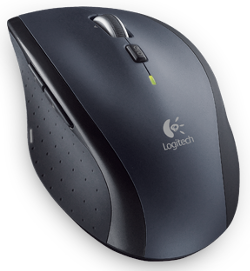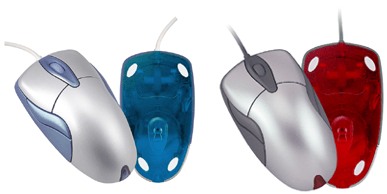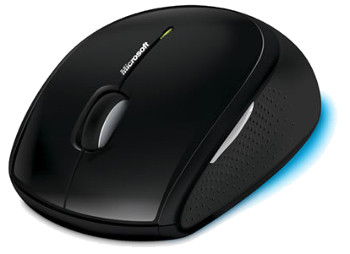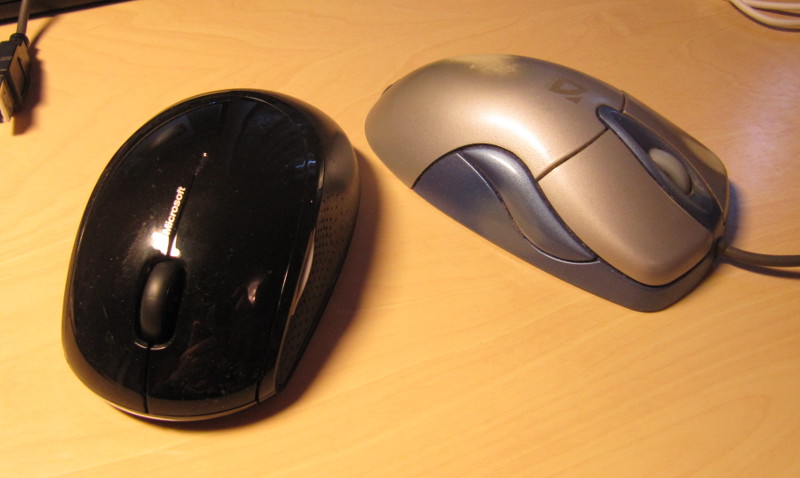Microsoft Wireless Mouse 5000: The Good, the Bad and the Ugly.
Posted on 28 May 2013 in Articles • 4 min read
Why MS Wireless 5000?
There is an odd thing people notice, looking and my working place: the mouse is on the left side. Usually the following question is: "Are you left-handed?" - "I'm not!". Long ago my father pointed out that a right-handed person can have a free hand for other tasks (like writing with a pen) if the mouse remains in the left hand. I am now more confident having the mouse on the left side, that on the right. But guess what is the trick in this situation? Most modern ergonomical mice are created for right-handed persons. For example, this nice Logitech M705:

One would find very hard times using it with the left hand. You are probably asking "why not use symmetrical mouse?". And that is exactly the kind of mouse I've been using since 2005. This is my old Defender (the blue one):

A funny story about it: Back in 2005 I went to a store looking for a USB mouse, as the PS/2 mouse was not working with the Linux Mandrake distro (early 2.6 kernel) on my dorm roommate's PC.
All these years the mouse was working perfectly. But then, I married and started sharing the computer with my wife. Guess how happy she was about the mouse on the left side :) Dragging the wired mouse here and there created a mess with all the adjacent cables. It was clear that a time to buy a wireless mouse had finally come.
Of course, my choice would have been dramatically influenced by the old mouse. I was looking for something:
- wireless,
- symmetrical,
- big enough to fit my palm,
- with side buttons
- and laser sensor.
I have considered several models, which dropped out of the list one-by-one (for example the Logitech M525 was not big enough for my palm). In the end, the only mouse that seemed to fit all these requirements was:

The Good
My palm lies firmly on the mouse, the dimensions are 7x12 cm (2.8x4.6) inches. Two AA batteries add weight which gives the overall feeling of a solid device. The side panels are made from rubbery material. The BlueTrack laser is perfect, it literally works on any surface (I was able to use it on my kneecap :). Finally the wireless signal range is at least 3-4 meters (10-13 feet).
The Bad
I have been extensively using the side buttons on the Defender for convenient forward and back navigation in browsers. The side buttons on Defender are big and located directly under the thumb and the little finger. The side buttons on MS 5000 are small and very hard to click as they are located above of where thumb and little finger are placed:

I'd wish that was the only problem with the buttons, but there is something much worse: the middle button. The middle button has a "horizontal scrolling" feature, which can be used by pushing the button sideways. In practice, 80% of "middle click" ends up in horizontal scrolling, because the button is very stiff to click. I use middle click a lot, especially when browsing (e.g. for opening the links in background tabs). And it became a real headache to perform that operation with this mouse. Luckily...
The Ugly
Luckily, I am a Debian GNU/Linux user :) With Debian you can easily override the keymap of any X11 device. For example, it is possible to map the horizontal scroll buttons as a middle-click! To do a quick temporal change to the buttons map, run xinput. This is the output on my computer:
1 2 3 4 5 6 7 8 9 10 11 12 13 14 15 16 17 18 | zaur@z:~% xinput
⎡ Virtual core pointer id=2 [master pointer (3)]
⎜ ↳ Virtual core XTEST pointer id=4 [slave pointer (2)]
⎜ ↳ HID 044e:3012 id=10 [slave pointer (2)]
⎜ ↳ PS/2 Mouse id=17 [slave pointer (2)]
⎜ ↳ AlpsPS/2 ALPS GlidePoint id=18 [slave pointer (2)]
⎜ ↳ Microsoft Microsoft® 2.4GHz Transceiver v7.0 id=12 [slave pointer (2)]
⎜ ↳ Microsoft Microsoft® 2.4GHz Transceiver v7.0 id=13 [slave pointer (2)]
⎣ Virtual core keyboard id=3 [master keyboard (2)]
↳ Virtual core XTEST keyboard id=5 [slave keyboard (3)]
↳ Sony Vaio Keys id=6 [slave keyboard (3)]
↳ Power Button id=7 [slave keyboard (3)]
↳ UVC Camera (05ca:183b) id=8 [slave keyboard (3)]
↳ HID 044e:3013 id=9 [slave keyboard (3)]
↳ AT Translated Set 2 keyboard id=16 [slave keyboard (3)]
↳ Microsoft Microsoft® 2.4GHz Transceiver v7.0 id=11 [slave keyboard (3)]
↳ USB2.0 Camera id=14 [slave keyboard (3)]
↳ Topre Corporation Realforce 105U id=15 [slave keyboard (3)]
|
For some reason there are two Microsoft Transceivers devices. To find the required one, run xinput get-button-map device_id, where device_id is either 12 or 13, e.g.:
1 2 | zaur@z:~% xinput get-button-map 13 1 2 3 4 5 6 7 8 9 10 11 12 13 |
In order to set the desired keymap of the device, run the xinput command as follows:
1 | xinput set-button-map 12 1 2 3 4 5 2 2 8 9 10 11 12 13 |
Here, 2 is the code of the middle button which overrides the codes of "scroll left" and "scroll right" (6 and 7).
To make the change permanent, create a config file (e.g. 10-ms5000.conf) in /etc/X11/xorg.conf.d/ directory, with the following content:
1 2 3 4 5 | Section "InputClass"
Identifier "MS 5000"
MatchProduct "Microsoft Microsoft® 2.4GHz Transceiver v7.0"
Option "ButtonMapping" "1 2 3 4 5 2 2 8 9 10 11 12 13"
EndSection
|
The conclusion
Microsoft Wireless Mouse 5000 is 75% worth its money (35EUR), especially for users who are looking for a big and symmetric mouse.
It has a minor (small side buttons) and a major (stiff middle click) glitches, which are not that bad to ignore this mouse.
I hope you enjoyed the review. Feel free to comment and share you mouse experience!